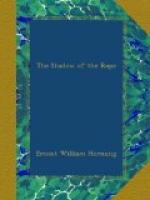“If only I could begin my life again!” said Rachel to herself, but aloud, in a way that made no secret of her last, most desperate inclination.
“That is exactly what I wish you to do,” Steel rejoined quietly, even gently, his hand lying lightly but kindly upon her quivering shoulder. How strong his touch, how firm, how reassuring! It was her first contact with his hand.
“I wish it so much,” he went on, “that I would have your past life utterly buried, even between ourselves; nay, if it were possible, even in your own mind also! I, for my part, would undertake never to ask you one solitary question about that life—on one small and only fair condition. Supposing we make a compact now?”
“Anything to bury my own past,” owned Rachel; “yes, I would do anything—anything!”
“Then you must help me to bury mine, too,” he said. “I was never married, but a past I have.”
“I would do my best,” said Rachel, “if I married you.”
“You will do your best,” added Steel, correcting her; “and there is my compact cut and dried. I ask you nothing; you ask me nothing; and there is to be no question of love between us, first or last. But we help each other to forget—from this day forth!”
Rachel could not speak; his eyes were upon her, black, inscrutable, arrestive of her very faculties, to say nothing of her will. She could only answer him when he had turned away and was moving towards the door.
“Where are you going?” she cried.
“To send to my solicitor,” replied Steel, “as I warned him that I might. It has all to be drawn up; and there is the question of a settlement; and other questions, perhaps, which you may like to put to him yourself without delay.”
CHAPTER IX
A CHANGE OF SCENE
The Reverend Hugh Woodgate, Vicar of Marley-in-Delverton—a benefice for generations in the gift of the Dukes of Normanthorpe, but latterly in that of one John Buchanan Steel—was writing his sermon on a Friday afternoon just six months after the foregoing events. The month was therefore May, and, at either end of the long, low room in which Mr. Woodgate sat at work, the windows were filled with a flutter of summer curtains against a brilliant background of waving greenery. But a fire burned in one of the two fireplaces in the old-fashioned funnel of a room, for a treacherous east wind skimmed the sunlit earth outside, and whistled and sang through one window as the birds did through the other.
Mr. Woodgate was a tall, broad-shouldered, mild-eyed man, with a blot of whisker under each ear, and the cleanest of clerical collars encompassing his throat. It was a kindly face that pored over the unpretentious periods, as they grew by degrees upon the blue-lined paper, in the peculiar but not uncommon hand which is the hall-mark of a certain sort of education upon a certain order of mind. The present specimen




